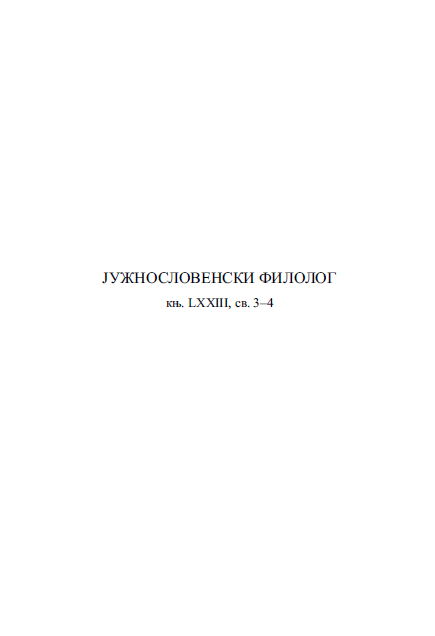ВРЕМЕНСКА УПОТРЕБА ПРЕТЕРИТАЛНИХ ОБЛИКА У ГОВОРУ СЕВЕРНОШАРПЛАНИНСКЕ ЖУПЕ СИРИНИЋ
THE TEMPORAL USE OF PRETERITE FORMS IN THE VERNACULAR OF THE SIRINIĆ ŽUPA IN THE NORTHERN ŠAR MOUNTAINS
Author(s): Bojana M. Veljović, Radivoje MladenovićSubject(s): Syntax, South Slavic Languages
Published by: Институт за српски језик Српске академије наука и уметности
Keywords: Sirinić; verb tenses; past actions; past tense; aorist; imperfect; pluperfect
Summary/Abstract: This paper analyzes verb tenses which primarily refer to past actions in the vernacular of the Sirinić Župa in the northern part of the Šar Mountains. The authors ascertain the inventory of forms which make up the preterite system of this vernacular, the syntactic and semantic conditions of their use, stylistic potential of each unit and the linguistic circumstances that make (im)possible their combining or interchange ability at the sentence level or within more extensive narrative sections. It turned out that the perfect has the most stable position – it is the most frequent form with the widest domain of use, while the aorist is the basic form which denotes actions experienced in the past stated by perfective verbs, and its place within the system is relatively stable. The past tense is most commonly used in stylistically neutral narration which involves zero emotional engagement, while the information about experiencing the action (or its lack) is usually absent from the narrative level or is part of the broader context, since it is not one of the primary perfective forms. When composing the narration, i.e. when recounting more complex events, the past tense is not normally used autonomously; it is combined with other forms of more specified semantics (aorist, imperfect, narrative imperative, future or present in the past). The role of the past tense in these contexts is to localize actions in time and to prepare for their introduction, while other forms give information on whether the effect of the action was experienced (aorist, imperfect), on whether the action was repetitive in the past (imperative, future), and the like. The imperfect is characterized by a much narrower use, while its syntactic and semantic potential is limited, which points to the fact that the process of its elimination is well under way, while the pluperfect has almost disappeared from the system.
Journal: Јужнословенски филолог
- Issue Year: 73/2017
- Issue No: 3-4
- Page Range: 35-60
- Page Count: 26
- Language: Serbian

